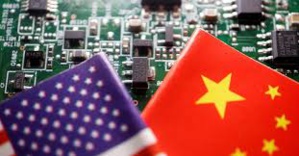The Biden administration is set to introduce a new rule expanding U.S. export controls on semiconductor manufacturing equipment to China, aiming to curb the growth of China's advanced chipmaking industry. However, this new measure will exempt key allies, including Japan, the Netherlands, and South Korea, which are critical exporters of chipmaking equipment, according to sources familiar with the rule.
This rule, an extension of the Foreign Direct Product rule, will prevent about half a dozen Chinese fabs at the forefront of the country's chipmaking advancements from receiving exports from several nations, including Israel, Taiwan, Singapore, and Malaysia. However, major chip equipment manufacturers like ASML and Tokyo Electron will not be affected, leading to a surge in their shares following the news.
The U.S. Commerce Department, which manages export controls, has not commented on the specifics of the rule. The move is part of broader U.S. efforts to impede China's progress in supercomputing and AI technologies, which could potentially benefit the Chinese military. The U.S. has previously imposed export controls on chips and related equipment for China in 2022 and 2023.
The new rule underscores Washington's strategy to pressure China's semiconductor sector while maintaining strong diplomatic relations with allies. The Foreign Direct Product rule allows the U.S. to block the sale of products made with American technology, even if produced abroad. This rule has been used to limit the export of chips made for Huawei, a central player in China's advanced chip development.
Additionally, the U.S. plans to tighten export control measures by lowering the threshold of U.S. content required for foreign items to fall under U.S. regulations, effectively closing a loophole in the current framework. The new regulations will also expand the restricted trade list to include approximately 120 Chinese entities, including several chipmaking fabs, toolmakers, and providers of electronic design automation (EDA) software.
The draft rule, which may still undergo changes, is expected to be published next month. It includes exemptions for over 30 other countries part of the A:5 group, alongside Japan, the Netherlands, and South Korea. The Commerce Department categorizes countries based on diplomatic and security considerations, influencing licensing requirements and export control regulations.
ASML and Tokyo Electron shares rose significantly following the news, with other Japanese chip-related equipment manufacturers also experiencing gains. The planned exemptions highlight the need for diplomatic finesse in enforcing export controls. A U.S. official emphasized the importance of multilateral support for effective export controls, stating, "Effective export controls rely on multilateral buy-in. We continually work with like-minded countries to achieve our shared national security objectives."
(Source:www.cnbc.com)
This rule, an extension of the Foreign Direct Product rule, will prevent about half a dozen Chinese fabs at the forefront of the country's chipmaking advancements from receiving exports from several nations, including Israel, Taiwan, Singapore, and Malaysia. However, major chip equipment manufacturers like ASML and Tokyo Electron will not be affected, leading to a surge in their shares following the news.
The U.S. Commerce Department, which manages export controls, has not commented on the specifics of the rule. The move is part of broader U.S. efforts to impede China's progress in supercomputing and AI technologies, which could potentially benefit the Chinese military. The U.S. has previously imposed export controls on chips and related equipment for China in 2022 and 2023.
The new rule underscores Washington's strategy to pressure China's semiconductor sector while maintaining strong diplomatic relations with allies. The Foreign Direct Product rule allows the U.S. to block the sale of products made with American technology, even if produced abroad. This rule has been used to limit the export of chips made for Huawei, a central player in China's advanced chip development.
Additionally, the U.S. plans to tighten export control measures by lowering the threshold of U.S. content required for foreign items to fall under U.S. regulations, effectively closing a loophole in the current framework. The new regulations will also expand the restricted trade list to include approximately 120 Chinese entities, including several chipmaking fabs, toolmakers, and providers of electronic design automation (EDA) software.
The draft rule, which may still undergo changes, is expected to be published next month. It includes exemptions for over 30 other countries part of the A:5 group, alongside Japan, the Netherlands, and South Korea. The Commerce Department categorizes countries based on diplomatic and security considerations, influencing licensing requirements and export control regulations.
ASML and Tokyo Electron shares rose significantly following the news, with other Japanese chip-related equipment manufacturers also experiencing gains. The planned exemptions highlight the need for diplomatic finesse in enforcing export controls. A U.S. official emphasized the importance of multilateral support for effective export controls, stating, "Effective export controls rely on multilateral buy-in. We continually work with like-minded countries to achieve our shared national security objectives."
(Source:www.cnbc.com)






